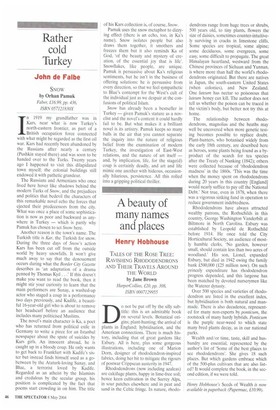Rather cold Turkey
John de Falbe
SNOW by Orhan Pamuk Faber, £16.99, pp. 436, ISBN 057121830X 1 n 1919 my grandfather was in Kars, near what is now Turkey's north-eastern frontier, as part of a British occupation force connected with what might be regarded as the first oil war. Kars had recently been abandoned by the Russians after nearly a century (Pushkin stayed there) and was soon to be handed over to the Turks. Twenty years ago I happened to visit this dilapidated town myself; the colonial buildings still endowed it with pathetic grandeur.
The Russians and Armenians who once lived here hover like shadows behind the modern Turks of Snow, and the prejudices and politics that bedevil the characters of this remarkable novel echo the forces that ejected their predecessors from the city. What was once a place of some sophistication is now as poor and backward as anywhere in Turkey — which is partly why Pamuk has chosen to set Snow here.
Another reason is the town's name. The Turkish title is Kar, the Turkish for snow. During the three days of Snow's action Kars has been cut off from the outside world by heavy snowfalls. It won't give much away to say that the denouement occurs during what the Border City Gazette describes as 'an adaptation of a drama penned by Thomas Kyd . . .' If this doesn't make you want to read the book, then it might stir your curiosity to learn that the main performers are Sunay, a washed-up actor who staged a coup in a performance two days previously, and Kadife, a beautiful 16-year-old girl who is about to remove her headscarf before an audience that includes many politicised Muslims.
The novel's main character is Ka, a poet who has returned from political exile in Germany to write a piece for an Istanbul newspaper about the spate of suicides by Kars girls. An innocent abroad, he is caught up in a bloody coup. He only wants to get back to Frankfurt with Kadife's sister but instead finds himself used as a gobetween by the Ataturk-loving Sunay, and Blue, a terrorist loved by Kadife. Regarded as an atheist by the Islamists and credulous by the secular group, his position is complicated by the fact that poems start crowding in on him. The title
of his Kars collection is, of course, Snow.
Pamuk uses the snow metaphor to dizzying effect (there is an echo, too, in Ka's name). Snow isolates people but also draws them together, it smothers and freezes them but it also reminds Ka of God, 'of the beauty and mystery of creation, of the essential joy that is life'. Snowflakes, like people, are unique. Pamuk is persuasive about Ka's religious sentiments, but he isn't in the business of offering solutions: he is persuasive from every direction, so that we feel sympathetic to Blue's contempt for the West's cult of the individual just as we despair at the confusions of political Islam.
Snow has already been a bestseller in Turkey — given Pamuk's stature as a novelist and the novel's content it could hardly fail to be. But what makes it a brilliant novel is its artistry. Pamuk keeps so many balls in the air that you cannot separate the inquiry into the nature of religious belief from the examination of modern Turkey, the investigation of East-West relations, and the nature of art itself — and, by implication, life, for the stage(d) coup is certainly deadly, and art and life mimic one another with hideous, occasionally hilarious, persistence. All this rolled into a gripping political thriller.












































































 Previous page
Previous page